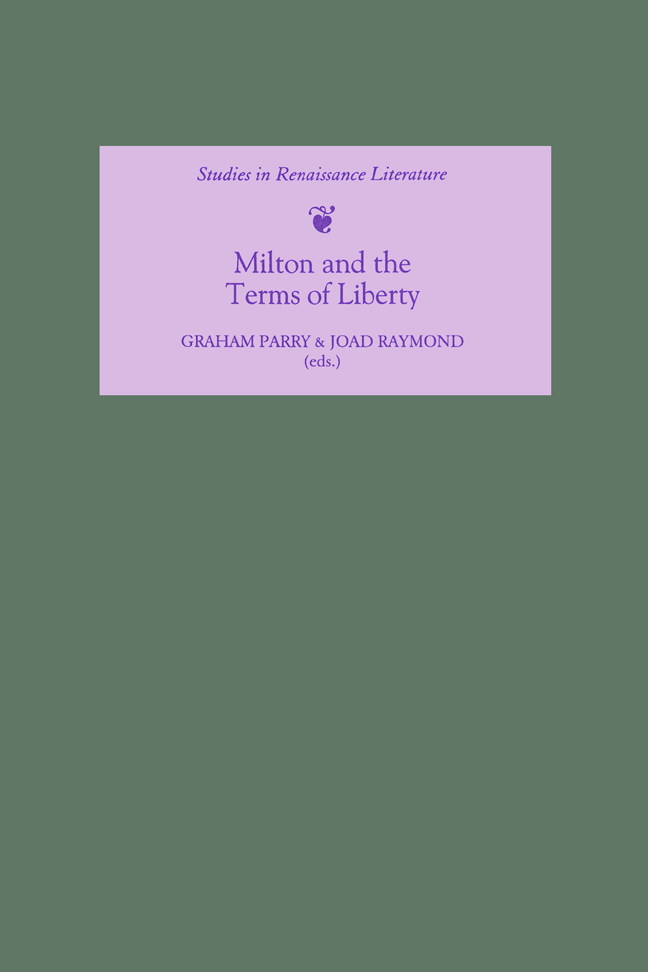Book contents
- Frontmatter
- Contents
- Contributors
- Acknowledgements
- Introduction
- 1 John Milton and the Politics of Slavery
- 2 Milton before ‘Lycidas'
- 3 Prosody and Liberty in Milton and Marvell
- 4 'In These Western Parts of the Empire': Milton and Roman Law
- 5 The King is a Thing
- 6 'in time of Warre … our Language is all corrupt with military Tearms': The Politics of Martial Metaphors in Post-regicide England
- 7 Alexander More Reads Milton: Self-representation and Anxiety in Milton's Defences
- 8 Stylometry and the Provenance of De doctrina christiana
- 9 The Figure and the Ground: Samson as a Hero of London Nonconformity, 1662-1667
- 10 The Publication of the King's Privacy: Paradise Regained and Of True Religion in Restoration England
- 11 'To try, and teach the erring Soul': Milton's Last Seven Years
- 12 Pandemonic Panoramas: Surveying Milton's ‘vain empires’ in the Long Eighteenth Century
- Index
- Studies in Renaissance Literature
1 - John Milton and the Politics of Slavery
Published online by Cambridge University Press: 15 February 2024
- Frontmatter
- Contents
- Contributors
- Acknowledgements
- Introduction
- 1 John Milton and the Politics of Slavery
- 2 Milton before ‘Lycidas'
- 3 Prosody and Liberty in Milton and Marvell
- 4 'In These Western Parts of the Empire': Milton and Roman Law
- 5 The King is a Thing
- 6 'in time of Warre … our Language is all corrupt with military Tearms': The Politics of Martial Metaphors in Post-regicide England
- 7 Alexander More Reads Milton: Self-representation and Anxiety in Milton's Defences
- 8 Stylometry and the Provenance of De doctrina christiana
- 9 The Figure and the Ground: Samson as a Hero of London Nonconformity, 1662-1667
- 10 The Publication of the King's Privacy: Paradise Regained and Of True Religion in Restoration England
- 11 'To try, and teach the erring Soul': Milton's Last Seven Years
- 12 Pandemonic Panoramas: Surveying Milton's ‘vain empires’ in the Long Eighteenth Century
- Index
- Studies in Renaissance Literature
Summary
I
KING Charles I was executed on 30 January 1649, and on 17 March the Rump Parliament took the still more revolutionary step of abolishing the office of kingship, arguing that ‘for the most part, use hath been made of the regal power to oppress and impoverish and enslave the subject'. Two days later, by a further Act of Parliament, the House of Lords was declared to be ‘useless and dangerous’ and was likewise ‘wholly abolished'. After pausing anxiously for two months, Parliament went on to draw the inescapable inference and proclaimed that ‘the people of England, and of all the dominions and territories thereunto belonging’ now constituted ‘a Commonwealth and Free State’ governed solely by the people's elected representatives. With this sequence of decisions, the people of Britain founded a republic for the first and (so far) the only time in their history.
These unprecedented events stood in urgent need of legitimation, and several different strands of political thinking were immediately pressed into service. Some defenders of the Commonwealth sought to occupy the constitutional high ground, arguing that Charles I had broken his contract with his people, and that the people's representatives had simply removed a tyrant and re-established lawful authority under their own command. Others argued, more concessively, that all governments are manifestations of the will of God, and thus that the new regime, no less than its predecessor, ought to be regarded as providentially ordained. Still others suggested in a yet more pragmatic and even Hobbesian vein that no government can hope to survive an examination of its original right to rule, and that the capacity of the new regime to protect its subjects should be accepted as a sufficient title to be obeyed.
Alongside these mainly post-Reformation arguments, a number of apolo- gists for the Commonwealth attempted instead to defend it in classical and, more specifically, in Roman law terms. According to this version of events, the people of England had been living in a state of servitude under the rule of Charles I. The abolition of the monarchy was therefore interpreted as an act of self-liberation on the part of an enslaved people who had thereby succeeded in regaining their birthright of freedom. Historians have paid less attention to these arguments, but there are several reasons for thinking them worthy of closer scrutiny.
- Type
- Chapter
- Information
- Milton and the Terms of Liberty , pp. 1 - 22Publisher: Boydell & BrewerPrint publication year: 2002

